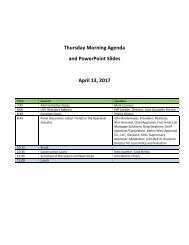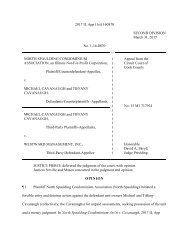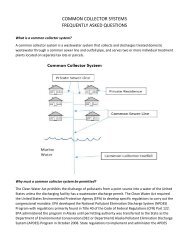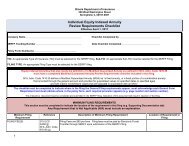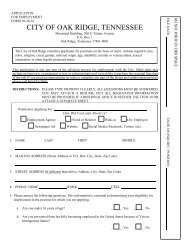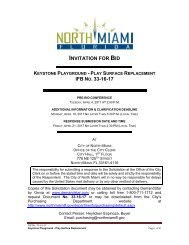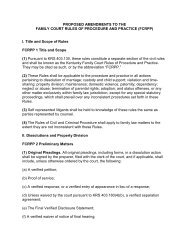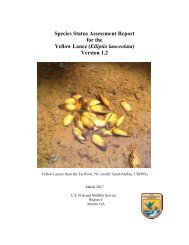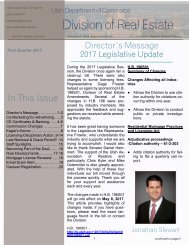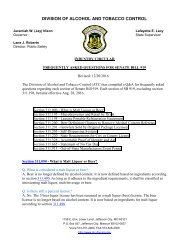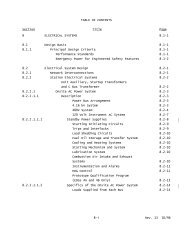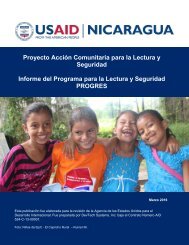Gender Integration
pbaae696
pbaae696
You also want an ePaper? Increase the reach of your titles
YUMPU automatically turns print PDFs into web optimized ePapers that Google loves.
3. CSO Activities and Outreach<br />
Challenge: Helping CSOs integrate a gender perspective<br />
into their work.<br />
Opportunities:<br />
• <strong>Gender</strong> analysis training. Build the capacity of CSOs<br />
to institutionalize the use of gender analysis and a gender<br />
perspective in their work so that their programs are<br />
accessible to and inclusive of men and women.<br />
• Building communities of practice. Facilitate partnerships<br />
and information sharing between CSOs with varying levels<br />
of experience in integrating gender and operationalizing<br />
inclusive policies and practices.<br />
• Accessible activities. Support CSOs in enacting policies<br />
and practices that are sensitive to formal and informal<br />
restrictions on mobility and association so that all people<br />
are equally able to participate fully in the organization’s<br />
activities. For example, changing when and where meetings<br />
and activities are held, making accommodations for travel<br />
concerns, and ensuring that adequate safety and security<br />
measures are in place are all essential elements in making<br />
sure that women and members of traditionally marginalized<br />
populations are able to participate meaningfully. In some<br />
environments, holding separate events for men and women<br />
or for youth and elders may be necessary to facilitate<br />
equitable participation.<br />
• Coalition building. Support the development of diverse<br />
civil society coalitions to advance gender equality as well<br />
as broader inclusion goals. For example, health or environmental<br />
organizations may also have a stake in furthering<br />
gender equality objectives. Facilitate and support partnerships<br />
among organizations that promote issues of<br />
importance to women, indigenous groups, persons with<br />
disabilities, and LGBTI individuals, in order to widen and<br />
deepen the reach of their efforts.<br />
• Girls and young women. Support programs and<br />
activities that focus specifically on building the capacity<br />
and participation of girls and young women, a group<br />
sometimes overlooked in both youth programming and<br />
programming for women. At the same time, support<br />
efforts to make existing organizations, programs, and<br />
activities more sensitive to and inclusive of the specific<br />
needs and interests of young women.<br />
• Literacy and language. Work with CSOs to develop<br />
civic and voter education campaigns that are sensitive to<br />
differences in oral and written literacy and do not utilize<br />
technical jargon or terms of art. Build the capacity of CSOs<br />
to utilize existing data regarding varying levels of literacy<br />
among, as well as between, certain groups. For example,<br />
while women and men in an indigenous community may<br />
not read the dominant language, women within that<br />
community may not even read the indigenous language.<br />
Where feasible, promote civic education campaigns that<br />
are integrated with literacy training and other forms of basic<br />
education, as this may engage a broader range of people.<br />
• Media and communication. Prioritize the use of varied<br />
means of communication appropriate to the target<br />
audience, including drama, performance, door-to-door<br />
canvassing, radio, television, SMS, and the Internet,<br />
including social media. Make sure that the people and<br />
images portrayed in these campaigns reflect the target<br />
audience.<br />
PROGRAM SNAPSHOT<br />
Prior to 2010, just one human rights<br />
group from Burkina Faso had submitted<br />
a shadow report to the UN Committee<br />
on the Elimination of all Forms<br />
of Discrimination Against Women<br />
(CEDAW) to provide a civil society<br />
assessment of the country’s progress<br />
advancing gender equality in accordance<br />
with its treaty obligations. The National<br />
Democratic Institute (NDI) convened a<br />
broad coalition of 19 Burkinabe CSOs,<br />
including women’s rights groups, women’s<br />
legal and professional associations,<br />
and human rights groups, and provided<br />
training on the requirements and procedures<br />
for submitting a shadow report.<br />
Participants then formed a committee<br />
of eight members, who were charged<br />
with drafting the report for submission.<br />
The coalition collected the necessary<br />
data, drafted the report, and presented<br />
it to the CEDAW Committee. The<br />
report provided an overview of the<br />
status of women and girls in Burkina<br />
Faso and described the existing challenges<br />
and gaps to full enforcement of<br />
the convention. At the same time, NDI<br />
and the coalition partnered with the<br />
National Assembly to deepen parliamentarians’<br />
understanding of CEDAW<br />
and to identify ways in which they could<br />
to contribute to its implementation.<br />
Source: “Burkina Faso Women Detail<br />
Discrimination Against Women in UN<br />
Report,” National Democratic Institute,<br />
February 25, 2010. https://www.ndi.org/<br />
node/16078<br />
28<br />
USAID | <strong>Gender</strong> <strong>Integration</strong> in Democracy, Human Rights, and Governance (DRG) Programming Toolkit



